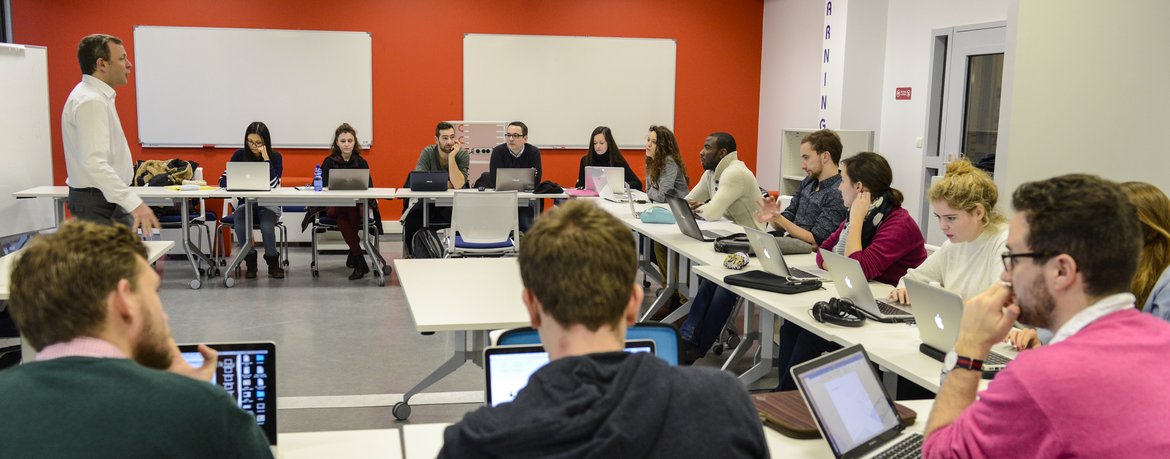Should we abolish educator tenure?

**The Edvocate is pleased to publish guest posts as way to fuel important conversations surrounding P-20 education in America. The opinions contained within guest posts are those of the authors and do not necessarily reflect the official opinion of The Edvocate or Dr. Matthew Lynch.**
A guest post by Julian Vasquez Heilig
Is tenure still an important tradition in the 21st century? This is a debate that comes up often in my discussions with policymakers and others. It’s also an issue that is currently flaring up in Scott Walker’s Wisconsin (See What’s Gone Wrong in Wisconsin?) There is an increasing cacophony that our ancestors’ of conception of educator tenure is obsoIete. I have two examples today (one personal and recent) relating to how tenure has an important role to play to protect academic freedom in our nation. I will begin with my story then segue to the explanation for the post A Mystery: What do you think is happening in this classroom? #ISupportMarilyn
I was recently “called into the principals office.” A source told me that Chris Evans, the Superintendent of Natomas Unified School District didn’t appreciate that I shared research about Teach For America with him. I have included a screenshot of the email I sent to him and the other board members below.
He contacted the Dean of the College of Education here at California State University Sacramento. I received a call from someone representing the College of Education (I won’t say who because I don’t want to put them on blast). I asked them to put their concerns in writing so I can forward them to the California Faculty Association (CFA). I also forwarded the email above to CFA and made them aware of Chris Evans’ attempt to temper my academic freedom. Fortunately, I am a tenured full professor and my academic pursuits are protected by a long and important tradition in this nation.
You have enemies? Good. That means you’ve stood up for something, sometime in your life. Winston Churchill
I think our ancestors understood the career danger presented to faculty who are tasked by our nation to create and disseminate knowledge. It’s important that faculty are protected via tenure from individuals with power and influence who want to silence dissent and creativity.
So maybe you might agree that tenure should stay in higher education, but should be done away in K-12 because of “‘all those lazy” teachers— a common refrain. Here is a case submitted by a California Cloaking Inequity reader that underscores the important of tenure (due process) and academic freedom for K-12 educators.
A student that wasn’t even in one of my classes came to my room when I wasn’t there and took a series of pictures. He photographed the Palestinian flag on my wall as well as other resources that express solidarity with Palestinian people. The pictures were turned over to a Zionist organization from outside of the local community. The Zionists promptly lodged a complaint with the site administrators as well as with the school district. The student in question argued that he did not feel “safe” on campus because of the materials on display in my room. A few days later, I stayed after school to work late. Upon returning to my room in the evening, I startled the assistant superintendent in charge of personnel who had let himself into my room and was examining the materials on my walls. He not only challenged the appropriateness of my Palestinian flag but also a poster of Malcolm X. He claimed that these items were too “controversial.” He suggested that I put up an Israeli flag to “balance” out my room. Later, I was informed by one of my school administrators that school board members had also been given access to my room in order to critique the items on my walls.
Eventually I received a letter signed by the lead as well as both assistant principals informing me that I was in violation of a district policy regarding controversial topics. I was given until the end of the week to remove the Palestinian flag along with other materials. The letter went on to explain that the materials in my room were too “controversial” and “unbalanced.” I was also informed that what I put up on the walls would continue to be monitored. I responded by removing every single poster, student work, instructional resource, and decoration from the room regardless if it was related to social justice for Palestinians. All that was left were four bare walls. Previously, my room was beautiful. It was full of art, student work, culturally relevant images that affirmed the rights of immigrants, women, gays and lesbians, African Americans, and the list goes on. I took it all down in protest. I decided to not play along with the school’s attempt to represent social justice for some groups but not for Palestinians.
Of course my students wanted to know what in the world was going on. This whole thing became an immense teachable moment that allowed me to teach even more about the conflict in Palestine. I also was very open with my students about the various ways I was resisting school authority as well as the consequences I was facing. Of course they were all excited, intrigued and hungry to learn more about not only Palestine but also various forms of civil disobedience.
After several months, I then was informed by one of the administrators that the school board requested that I redecorate my room “appropriately.” The administrator made sure to emphasize that it was the school board’s request. I told her that the school board could come to my room and decorate it themselves. I left the walls bare for months on end but eventually resisting in this way began to grind on me. I slowly began to reintegrate some of the images back on the walls. I felt like a sellout the first time I complied with their racist directives even though the bare walls proved to be an effective protest judging by the high level of student engagement and awareness around Palestine and permissible discourse in public spaces defined by White people.
Two years later, when I was assigned a new classroom, I decided to once again challenge my school district’s insistence on Eurocentric monoculturalism. However this time I committed to non-compliance short of dismissal. Furthermore, unlike my previous confrontation with the school district, I kept other teachers of color as well as like-minded White teachers abreast of my effort to confront the apartheid of knowledge we were all subjected to.
I decorated my new classroom with some of the images that had been displayed in my previous room. One poster called for the removal of the apartheid wall in the West Bank. A second supported the international call for boycott, divestment and sanctions on Israel. A third simply proclaimed solidarity with the people of Palestine in English, Spanish, and Arabic. In addition, a photograph of an Israeli soldier pointing his weapon down rage at a crowd of Palestinians was also displayed. The final display was a piece of art I co-created with two of my students. It included a characterization of a man holding a Palestinian flag. Next to the charcoal and water color image of the man, I expressed the following sentiment: “[My principals] lack the courage to lead on issues of equity and social justice. I propose that they support teachers that teach about human rights rather than silence their voices. I will create materials to educate others about the Palestinian struggle for self-determination and nurture my own critical consciousness about human rights.” The powder keg was put in place and the match was lit.
Since I was intentionally defying my principals, I knew I would find myself in hot water sooner rather than later. Knowing this, I invited teachers and friends to do gallery walks through my room. I discussed the images with my current classes and began integrating the images in my lessons. In short order the principals wrote me a letter informing me that I had three days to remove the posters described above as well as others that in the administration’s opinion were, “…not conducive to positive community-building.” I promptly removed the posters but outlined their former locations with blue painter’s tape in order to bring attention to the scene of the crime. At this point is where a camera caught one of my principals trying to catch me ridin dirty. Actually, it wasn’t that hard. I was acting in open defiance to the racist policies of my school district.
Watch the video of the knowledge surveillance below.
In response to the blue painter’s tape, the associate superintendent, the same one I caught lurking in my room after hours (again tryin to catch me “ridin dirty”), was sent to track down the runaway slave and bring me back to the plantation. Of course the sixteen page document that reprimands me for so called “unprofessional conduct” and “unsatisfactory performance” used none of this language but that is the essence of the matter. I was directed to not use the walls of my classroom as a forum to discuss controversial topics nonetheless I was required to maintain educational materials on the walls (See Jane run, Jack and Jill went up the hill, and the like). Furthermore, during the next two years, I was to seek written consent from site administrators before displaying posters, images, flags, or other materials in my classroom. In short I was to be a good little nigger and not dare to speak unless given permission to do so. I consider this letter in my employment file to be a badge of honor.
I am still resisting the racist directives I’ve been given. I am careful and strategic about what I display in my room but I’ll be damned if I will ever ask permission to speak. I continue to post without asking consent.
The essential question that my students have examined this entire year asks them to compare and contrast the experiences of indigenous populations in North America to the experiences of indigenous populations in Palestine after the arrival of European settlers. My walls enshrine my students’ answers to questions such as:
- What are Israel and Palestine?
- Why are Israelis and Palestinians fighting?
- How did this conflict start in the first place?
- Why is Israel occupying the Palestinian territories?
- Why is there fighting today between Israel and Palestine?
- Why does the violence keep happening?
- How is the conflict going to end?
- Why is it so hard to make peace?
Sue (2004) maintains that in order for ethnocentric monoculturalism to operate, the group in question must have the power to define the reality of other groups. My experiences give evidence of the power to define the reality of other groups. The apartheid of knowledge that exists in my school bestows Whites with the power to define the reality of other groups, it also “marginalizes, discredits, and devalues the scholarship, epistemologies, and other cultural resources of Faculty of Color” (Delgado Bernal & Villalpando, 2002, p. 169). Discussions on race at my school are not legitimized, my perspectives a teacher of color are not validated, and White school personnel are unwilling or unable to engage in dialogue that might lead to squarely confronting a different racial reality. The restriction of images and symbols described in this testimonials illustrate Sue’s (2004) conclusion that, “The extreme bias in knowledge construction from a Euro-American perspective means that the history taught to children is at best incomplete, and at worst, inaccurate and distorted.” The epistemological racism evident in the response of the schools, districts, and administrators illustrates characteristics present in all forms of apartheid; namely the separation, subordination and marginalization of the cultural norms, values, and knowledge of People of Color. As in Salazar’s (2005) study, “Participants received messages, communicated on institutional and individual levels, that served as daily reminders that they were outsiders” (p. 245).
Apartheid requires power. This narratives illustrate how power was exercised by establishing the omnipresence of authority in the form of school and district administrators, as well as elected school officials making clandestine visits to my classroom. The school system also exerted its power by dispensing disciplinary action. The school system used this power to define and impose its ethnocentric reality and beliefs upon the learning environment. Rather than facilitating dialogues about race, my school administrators were guarded and vigilant instead of truthful, open, and honest. School board policies that call for ”fairness,” and “balance” requiring teachers to maintained a so-called “objective perspective” were used to white-out courageous conversations about race, human rights, and justice. Evidence of subaltern counter-narratives was physically and forcefully eliminated.
Trepidation about allowing the perspectives of racially and culturally subjugated groups to be manifested within a preeminent site of cultural production, such as the school classroom, motivates the enforcement of the apartheid of knowledge. Apartheid requires an acknowledgement and fear of difference. However, this acknowledgement serves as justification for the school system to double down on its investment in the myth of colorblindness. The district and site administrators required me to be complicit in their efforts to be colorblind. Motivated by the need to be perceived as unbiased, and by fears of appearing to be anti-Semitic, I was required to deny my own experiential reality as an Afro-Latino by removing images and symbols that testified to the effects of racism and discrimination towards Palestinians. Thus, the school system reproduced and sustained ethnocentric monoculturalism through an apartheid of knowledge that enforces the use of modernist and Eurocentric definitions of fairness, balance, objectivity, truth and falsity, and ultimately the nature of reality.
Malcolm S.
With tenure this social studies teacher is protected from powerful political forces and guaranteed due process. However, that didn’t stop the district from marring this teacher’s record with a complaint. Tenure is not obsolete if we believe in a vibrant democracy that values debate and dissent. Enlightenment vs. hegemony.
Democracy must be built through open societies that share information. When there is information, there is enlightenment. When there is debate, there are solutions. When there is no sharing of power, no rule of law, no accountability, there is abuse, corruption, subjugation and indignation. — Atifete Jahjaga
Apartheid of Knowledge— It’s not just Soweto, it’s in California too.
Works Cited
Delgado Bernal, D. & Villalpando, O. (2002). An Apartheid of Knowledge in Academia: The struggle over the “legitimate” knowledge of faulty of color. Equity & Excellence in Education, 35:2, 169-180.
Sue, D. W. (2004). Whiteness and ethnocentric monoculturalism: Making the “invisible” visible. American Psychologist, 59 (8), 759-769.
Salazar, C. F. (2005). Outsiders in a White, middle-class system: Counselor educators of Color in Academe. Journal of Humanistic Counseling, Education and Development, 44, 240-252.
This post originally appeared on Cloaking Inequality, and was republished with permission. Follow Julian Vasquez Heilig on Twitter: @professorjvh.
____________________________
Julian Vasquez Heilig is an award-winning researcher and teacher. He is currently a Professor of Educational Leadership and Policy Studies and the Director of the Doctorate in Educational Leadership at California State Sacramento.







